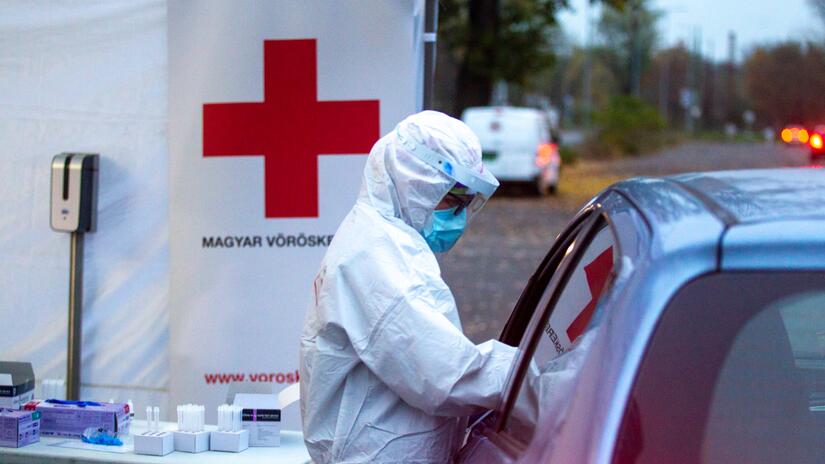Rebeka Szilágyi was working as a midwife in a hospital in Budapest when the COVID-19 pandemic hit and she decided to join the Hungarian Red Cross’ H-HERO Health Emergency Response Unit. Her story illustrates the struggles and rewards of frontline volunteers:
“When the first wave of coronavirus reached Hungary and the pressure on hospitals intensified, I worked in a COVID-19 ward for six weeks. So when numbers started to rise again in autumn I volunteered, telling my boss that I would be happy to go back.
“One day in November I got a phone call saying that the Intensive Care Unit (ICU) was in dire need of help. I expected that this would be a much bigger and serious task than it was in the spring – and I was right. I have been working in the ICU for seven months now, and I don’t regret it at all: I would come again.
“The COVID-19 Intensive Care Unit where I volunteer is like an enclosed arena where you have to fight a new enemy day in and day out. You never know what challenges you’re facing that day, because every patient is different even if the illness is common to all of them.
“At first, it bothered me that after a few minutes I would be warm under the plastic coverall, double mask, glasses and three gloves, but later I didn't even notice them. Now I get caught up in tasks and sometimes realise that four or five hours have passed without me taking a sip of water, eating a bite or just sitting down. It’s a job that – as we say – can’t be finished, just stopped.
“We don’t spare time or energy for our patients, and it’s difficult to accept that sometimes nothing can be done. Our hearts squeeze as sobbing relatives come in to say goodbye to a loved one. That was the case with a patient I had a small conversation with recently, and who was put on ventilation in my shift. I saw that COVID-19 was finally crushing his system. Smiling photos of grandchildren and relatives appeared from his belongings as I prepared the inventory of his personal items. I let out a sigh, and my own family came to mind. And the people I saw the day before in the supermarket, not keeping their distance, the mask pulled down to their chin... And the social media posts where they debated how severe the situation is, how effective vaccines are.
“Our team in the hospital is fantastic. We are like a small family. On the toughest days, we keep our spirits up together. I truly look up to my colleagues: from doctors, nurses and other medics to cleaning staff, each and every one of them are true heroes! I am proud to be one of them, to work with them.
“The situations I have experienced over the last months have left a deep impression on me. I have learned a lot in terms of humility and perseverance in addition to professional knowledge. The desire to help – the reason why I chose healthcare for a living – has become stronger in me. But, along with my colleagues, I am of course looking forward to the end of this devasting pandemic.”
Hungary has registered more than 808,000 confirmed cases and 30,000 deaths linked to COVID-19. With support from the International Federation of Red Cross and Red Crescent Societies (IFRC), the Hungarian Red Cross has significantly scaled up both prevention and response activities. These include awareness-raising initiatives; direct support to hospitals with equipment, material resources and volunteers, logistical assistance, help with testing and vaccination, and operating the dispatch centre of the national ambulance service.

